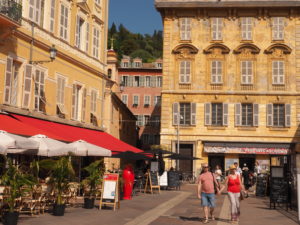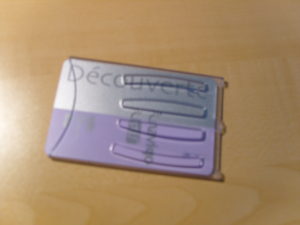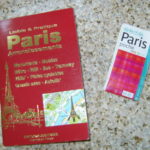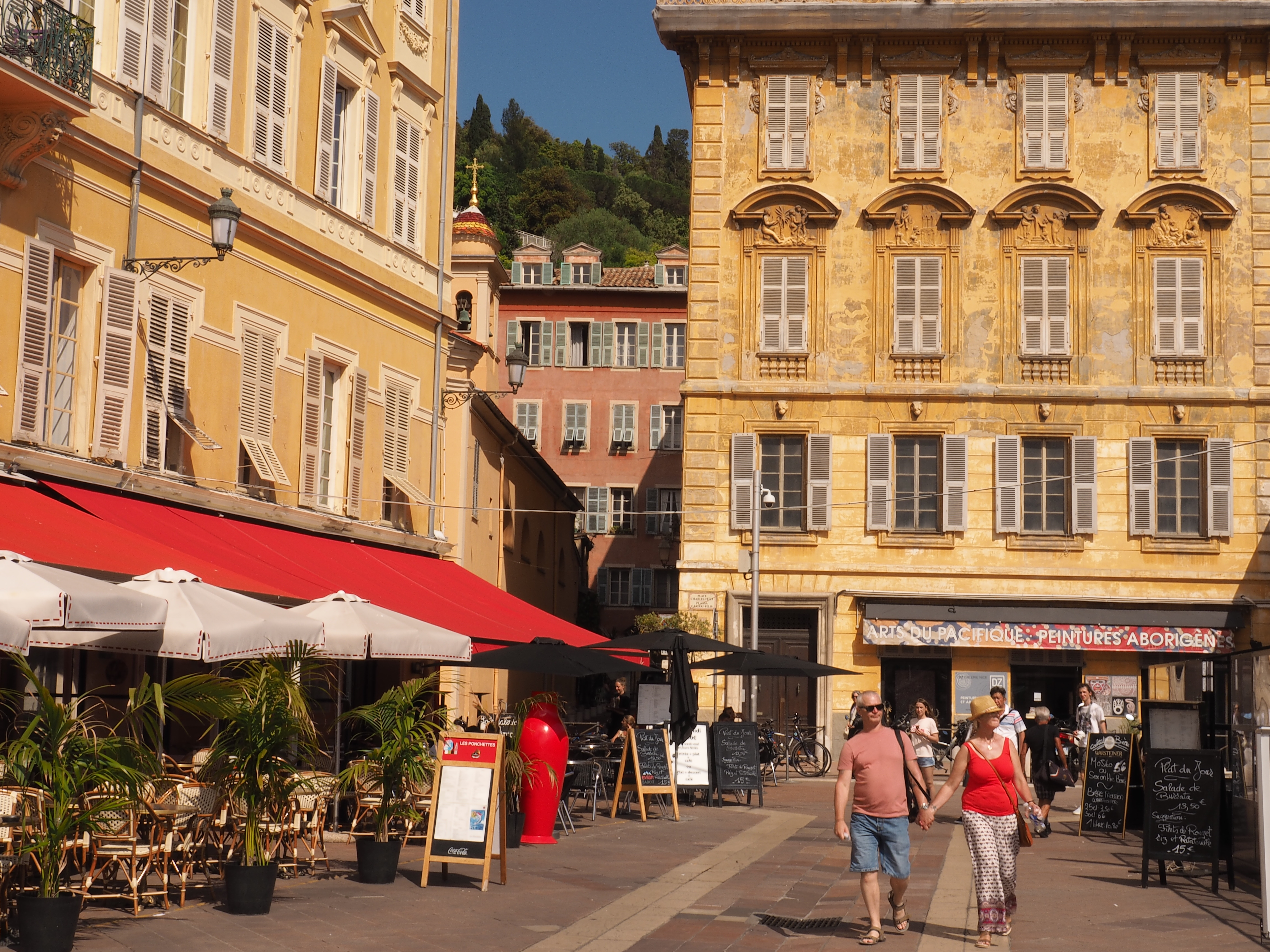Last month I published some tips for traveling in France, general tips to make your travels more enjoyable. But I’ve just returned from France and want to share nine more tips, the “nitty gritty” kind that you need to know just when you don’t expect it. And these are the ones that help you avoid a bump or simply add to your enjoyment.

Downtown Nice
- The Monoprix Sac: All over France is a supermarket called Monoprix. It’s a nice, upscale grocery store with clothing and other products as well. At the cash register, you’ll likely see a small bag for about 3 Euros. This bag is indispensable (see photo.) Inside the small bag is a larger bag. It’s easy to carry and the bigger bag is perfect for trips to the open-air market, picnics, shopping trips, or those grocery stores that don’t give you bags (common in Europe and getting more common in the U.S.)

The Monoprix Sac
- Have a few Euros in change in your car for tolls. You never know if your particular bank card will be accepted at toll booths if you’re driving in France. It will save you some stress on French highways!
- Take a Swiss Army knife or something similar (I have an off-brand that does the same thing.) It’s great for picnics, but also will serve if you’ve bought something and can’t open the package or want to remove tags from newly-purchased clothing. You’ll have a knife, fork, spoon, and corkscrew for all of your daily needs!
- Most European hotels (possibly all of them) do not offer washcloths, only towels and maybe hand towels too. If you are someone who likes using a washcloth and doesn’t feel clean without one, take one from home and keep it in a plastic bag. That way if you need to change hotels and your cloth isn’t quite dry, it won’t get anything wet in your suitcase.
- At the end of a trip, try to keep a few Euros (10 to 20) and a spare metro ticket on hand for your next trip. Next time you come to France you can get to your hotel and get settled before you’ll need to think about buying metro tickets or changing money.
- Make sure your bank knows that you are traveling. Currently, bank security will lead to your card being blocked if you leave the country without notifying them because they will suspect fraud. Another tip regarding bank cards, be sure to have a credit card that doesn’t charge you a change fee. Some cards charge 3% and others charge nothing. I used my debit card a few times and was charged an international transaction fee for the purchase, a percentage of the total. When I withdrew cash, I was charged the withdrawal fee AND a percentage. It would have been much better to use my credit card for everything. I did use it for almost everything (to get miles) but forgot my code. Learn from my mistakes!
- If you rent a car and the clerk does not personally go over damages already on the car, DON’T sign the form until you have checked it yourself. Again, learn from my mistake. I rented a car which was parked a few streets away from the rental office and the clerk did not go over the damages personally. She just mentioned them and urged me to sign the form. Don’t sign anything until you’ve seen it yourself. Added IMPORTANT tip: Try your best not to speed. France has many cameras installed everywhere and will take your photo. Being in a rental car will not spare you a fine, trust me. For a small increase of 10 km per hour, you could face 90 Euros fine, which you’ll get it in the mail about 2 months after the fact. (You can’t escape the French police! )
- If you have an e-ticket for train travel, make sure you print the ticket itself, not just the confirmation. They can look similar. Make sure it says “ticket” or “billet” on it. Tickets on your phone app are accepted, but I haven’t used one, so can’t confirm how this works. You won’t need to composter (date stamp) the paper ticket since it’s not possible. Click here for more on train travel.
- If you will be in Paris for a week or close to it and you arrive on Monday or Tuesday, your best public transportation bargain is the Carte Découverte. It is a pass that runs from Monday to the following Sunday. It costs 27 Euros, though 5 of that is for the little plastic case you carry the card in. If you recharge the card or use it on another trip, you’ll just pay the 22 Euros (or whatever the cost is for transport when you return to Paris.) It covers all 5 zones too, which means you can go to Disneyland, Versailles, or the Charles de Gaulle airport on the same pass. It covers the Roissy Bus as well if you want bus transportation to get you to the airport (which I like better than the train, and it’s much cheaper than a taxi.)

The Decouverte transport card for Paris
The current cost of a carnet, or book of 10 metro tickets, is about 15 Euros. So, for less than the cost of 2 carnets you can travel on any mode of transportation (metro, tram, bus, or RER) and access all 5 zones outside Paris (a metro ticket will only get you to zone 2) for only 22 Euros plus 5 for the case (see photo.) They will want a photo of you on the card. Take a small photo (size of a driver’s license photo) with you on your trip. If you don’t have one go to Monoprix and have an ID photo made (about 6 Euros for 5 photos which you likely won’t need) or they have a machine now that allows you to print off a photo of yourself from your phone, but I was unable to size it smaller for the card. The final option worked for me. I made a simple photocopy of my American driver’s license photo and stuck it onto the card.
Here are some additional helpful things: The booklet on the left shows all the districts of Paris with streets as well as monuments and other sites. You can get one at a kiosk for 6 Euros. They are indispensable for the repeat Paris traveler who wants to find specific streets. The tiny map is the free metro map you get at the info counter. It opens up to a full-size metro map.
Many more tips in Magical Paris.

I hope these tips make your trip to Pa ris and all of France that much better! Do you have any more tips you can add?
ris and all of France that much better! Do you have any more tips you can add?





